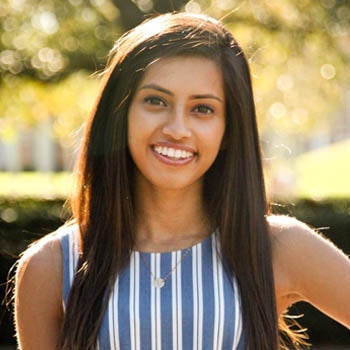Major: Neuroscience
Research Advisor: Simon Fischer-Baum
As a Neuroscience major, Shreya Ingle has always been fascinated by something one of her high school teachers once said: “Sometimes, the best way to learn about the function of a body part by analyzing cases of its dysfunction.” Thus, she enjoys working with patients recovering from strokes and other neurological disorders to better understand the brain.
This has motivated Shreya to spend two years conducting research to better understand how strokes can affect very specific language abilities and cause aphasia. As a research assistant in Dr. Simon Fischer-Baum’s Lab, Shreya has been doing background testing on patients and using diffusion tensor imaging to better characterize how strokes disrupt the connections between different regions in the brain.
“Previously, I had learned about the brain as being split into independent, isolated areas that were each responsible for their own function,” Shreya said. “But at Rice, I have come to learn that looking at the connectivity between different regions of the brain can lead to a more holistic understanding of how the brain works and allow for the development of more targeted therapies. Working in the Fischer-Baum lab has challenged me to apply concepts I have learned in my courses, think critically about how to interpret testing results, and develop my communication skills with patients that have severe language deficits.”
Working directly with patients has heightened Shreya’s awareness of how brain injuries impact patients’ daily lives and has motivated her to work with Alzheimer’s patients at a facility in Houston. As one of the directors of Rice Alzheimer’s Buddies for the upcoming year, Shreya hopes to work with Alzheimer’s facilities in Houston to plan engaging events for the facility residents and strengthen the Alzheimer’s Buddies volunteer program. Her passion for neuroscience and teaching has also led her to become a mentor with BrainSTEM, through which she teaches neuroscience to middle and high school students every week. “It is incredible to see students who were not very engaged initially become more comfortable with neuroscience topics, ask thoughtful questions about the lessons, and even start talking to me about pursuing a major in neuroscience one day,” said Shreya.
As Co-President of the Rice South Asian Society for the upcoming year and a member of the Rice Bhangra Dance team, Shreya has also found ways to stay connected with her culture. “The Rice Bhangra Dance team has been an incredible outlet for me to learn a new form of dance that I have always wanted to learn and serves as a great way to relieve stress during busy weeks. It’s so nice to be a part of a team where practices are filled with great music and amazing people,” she said. “In addition, the Rice South Asian Society has allowed me to connect with so many students at Rice, learn about their experiences with South Asian culture, and reflect on the different aspects of what it means to be South Asian.”
In the future, Shreya hopes to attend medical school and use her passion for working with patients to make a tangible impact in patient care. She believes that engaging in research and working directly with patients will help pave the way to finding new therapies for patients with neurological disorders.

